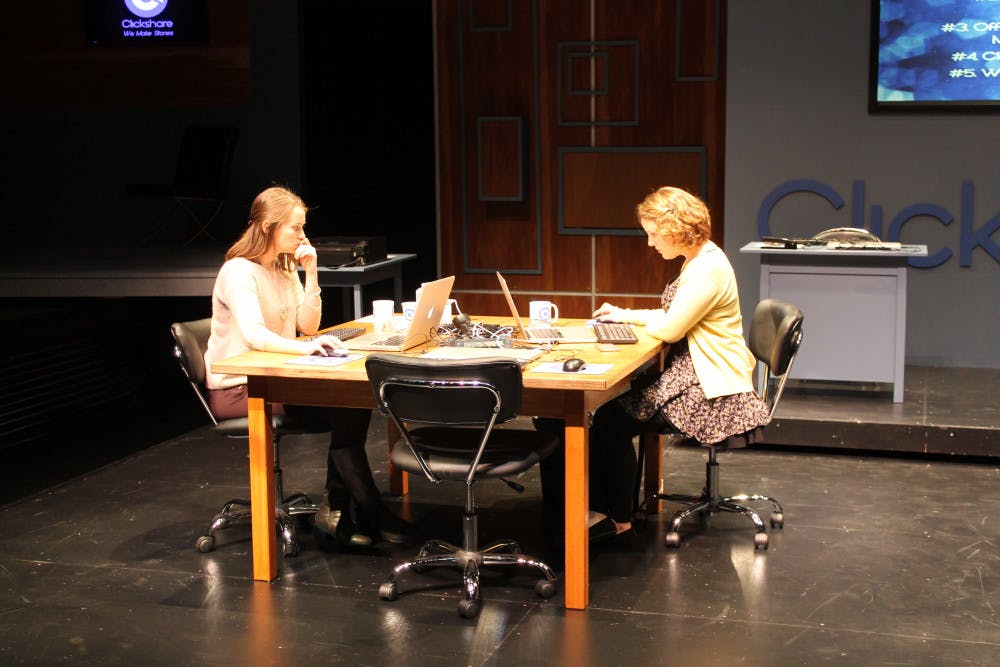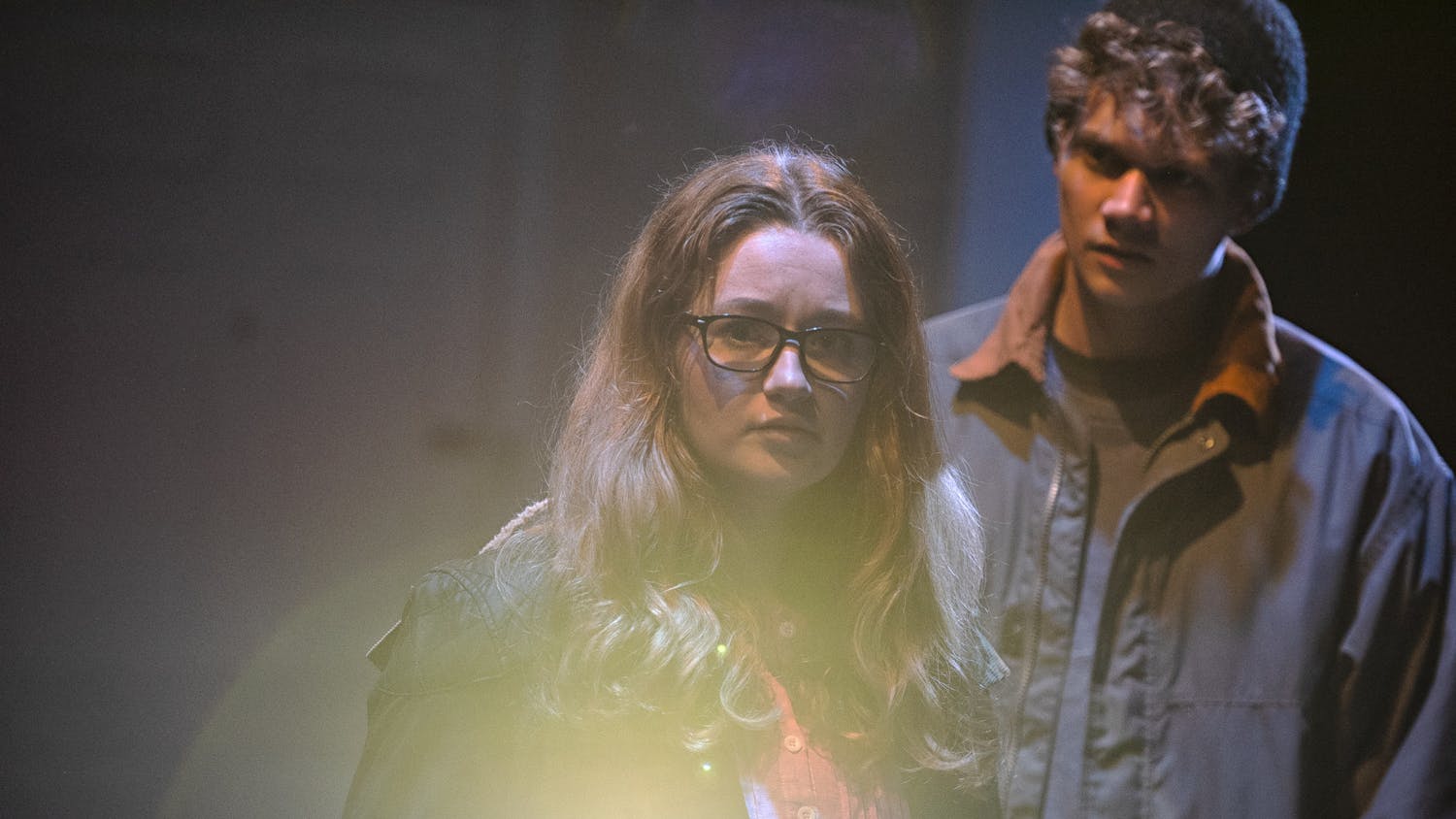Clickshare, a new play by Lucas Kavner ’06.5, premiered this weekend at the Seeler Studio Theatre at the Mahaney Center for the Arts (MCA). Directed by Associate Professor of Theatre Alex Draper and featuring an original company composed entirely of current Middlebury students, Clickshare proved a deft satire painted pitch-black – a raucous send-up of new media, hero-worship and corporate culture.
Clickshare was developed this summer at MIDDSummer Play Lab before it was brought on as a faculty show this fall, undergoing additional tweaks at the beginning of this semester. Taking place almost entirely in the offices of Clickshare, a news-aggregate site in the style of The Huffington Post or Buzzfeed, Clickshare charts the experiences of new-hire Ashley as she adjusts to her new position and stumbles across a potentially paradigm-shifting news story.
While not the first to tackle the start-up culture of our times, Kavner readily digs to its roots, unearthing the lunacy of our new status quo. The office of Clickshare that Kavner creates is a world as rich as Alice’s Wonderland, possessing its own similarly irrational logic and populated by its own cast of colorful characters.
And yet, much of the setting’s strength stems from the blurring of what is real and what is imagined. Before developing Clickshare, Kavner spent some time working at The Huffington Post, an experience that undoubtedly influenced his realization of Clickshare. The high-pressure climate, the unhinged corporate culture and the ludicrous premise of Clickshare will all be eerily familiar to anyone who has spent some time working within the start-up set.
Satire comes almost too easily to such a world – Clickshare drips with caricature, willing to veer into territory that is shocking in its absurdity. Yet Kavner’s script is perfectly paced, each element carefully balanced. Larger-than-life characters are offset by the goofy earnestness of the play’s central band of heroes; wild conspiracy plots and apocalyptic undertones are rooted in a highly realistic recreation of start-up culture. Dialogue is sharp and unyielding, but makes room for painfully realistic asides and rewarding banter. Clickshare is filled with outrageousness, but is so lucidly paced that the audience is never left behind, able to enjoy the surface pleasures of its plot machinations while contending with the complex implications at the play’s core.
The cast makes remarkable work of Clickshare’s competing tones and influences. Eliza Renner ’18 is perfectly pitched as new girl Ashley, alternatively earnest and willing to succumb to the darker forces that govern Clickshare and the culture of new media. Caitlin Duffy ’15.5 brings out the subtleties of veteran Clickshare “logger” Ria, hard-edged and assertive but never cartoonish. Jackson Prince ’17 and Oliver Wijayapala ’17 round out the core players, respectively embodying charming slacker Colin and neurotic pragmatist Zak.
Of the eccentric members of Clickshare’s hierarchy with which our heroes contend, Baz Ramos, played by Miguel Castillo ’17.5, and Milano, played by Alexander Burnett ’16, are highlights. Castillo suffuses the suave Ramos with equal parts charm and empty-headedness, an apt symbol of the simultaneously attractive and idiotic Clickshare itself. Burnet’s Milano is revelatory, the force around which the production revolves. An image in blue slip and blonde wig, Milano is all sly smile, assertive gait and untraceable accent. Ethereal and impressive, Milano is the face of Clickshare, its grand ideals in near-human form. She is a TedTalk, a graduation speech, incarnate. The juxtaposition between such a high-minded figure and the pettiness that marks the experiences of the four loggers at the center of the play powerfully dismantles many of the notions of progress and humanism that Silicon Valley and its ilk often invoke.
And yet, Milano is resolutely attractive and admirable. As the play’s dark center is slowly teased out, perhaps the greatest mystery remaining by the end is that of Milano. Is she the icy, gleaming face of evil, impressive cheekbones and all, or is she merely the projection of our own aspirations and desires, a waking dream?
These and other contradictions make for an unclear takeaway. Far from finger-wagging, Kavner’s play is characterized by ambiguity. The audience is left wondering: are these companies suffused with poor intentions? Are we as consumers the drivers of their success or victims of their manipulations? While Clickshare undoubtedly prompts such questions, it thankfully avoids professing a political agenda. Questions raised are questions to be mulled over well into the future.
As director Alex Draper suggests, “I think that the crisis that it’s addressing, which is pretty substantial, is not immediately new, nor is it going to go away anytime soon.”
Yet perhaps by its very traditional theater format, Clickshare offers some optimism in our age of overwhelming digitalization.
“I find that fundamentally, we are going to recognize in ourselves the need to get out of our houses to be near live human beings and hear them tell a story,” says Draper. “My optimistic, aspirational view is that theater is not threatened at all, but that it’s deep need will be affirmed and reaffirmed over and over again.”
Clickshare Satirizes Corporate Culture

Comments



